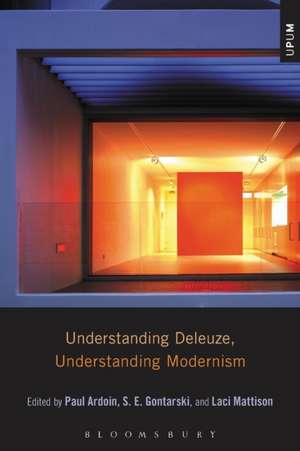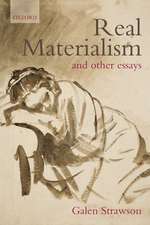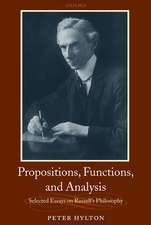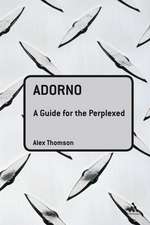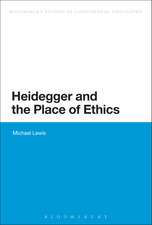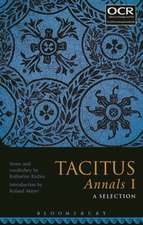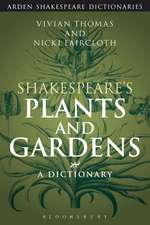Understanding Deleuze, Understanding Modernism: Understanding Philosophy, Understanding Modernism
Editat de Paul Ardoin, Professor S. E. Gontarski, Dr. Laci Mattisonen Limba Engleză Paperback – 23 mar 2016
| Toate formatele și edițiile | Preț | Express |
|---|---|---|
| Paperback (1) | 258.33 lei 6-8 săpt. | |
| Bloomsbury Publishing – 23 mar 2016 | 258.33 lei 6-8 săpt. | |
| Hardback (1) | 582.25 lei 6-8 săpt. | |
| Bloomsbury Publishing – 22 oct 2014 | 582.25 lei 6-8 săpt. |
Din seria Understanding Philosophy, Understanding Modernism
- 39%
 Preț: 498.72 lei
Preț: 498.72 lei - 23%
 Preț: 192.82 lei
Preț: 192.82 lei - 30%
 Preț: 570.60 lei
Preț: 570.60 lei - 22%
 Preț: 226.51 lei
Preț: 226.51 lei - 22%
 Preț: 259.79 lei
Preț: 259.79 lei - 13%
 Preț: 238.84 lei
Preț: 238.84 lei - 13%
 Preț: 238.22 lei
Preț: 238.22 lei - 22%
 Preț: 239.21 lei
Preț: 239.21 lei - 22%
 Preț: 238.01 lei
Preț: 238.01 lei - 22%
 Preț: 233.08 lei
Preț: 233.08 lei - 22%
 Preț: 226.51 lei
Preț: 226.51 lei - 22%
 Preț: 226.14 lei
Preț: 226.14 lei - 23%
 Preț: 198.93 lei
Preț: 198.93 lei - 23%
 Preț: 197.86 lei
Preț: 197.86 lei - 23%
 Preț: 194.33 lei
Preț: 194.33 lei - 23%
 Preț: 192.64 lei
Preț: 192.64 lei -
 Preț: 194.33 lei
Preț: 194.33 lei - 23%
 Preț: 191.75 lei
Preț: 191.75 lei - 30%
 Preț: 570.34 lei
Preț: 570.34 lei - 30%
 Preț: 539.73 lei
Preț: 539.73 lei
Preț: 258.33 lei
Preț vechi: 295.84 lei
-13% Nou
Puncte Express: 387
Preț estimativ în valută:
49.43€ • 53.86$ • 41.65£
49.43€ • 53.86$ • 41.65£
Carte tipărită la comandă
Livrare economică 23 aprilie-07 mai
Preluare comenzi: 021 569.72.76
Specificații
ISBN-13: 9781501325038
ISBN-10: 1501325035
Pagini: 304
Dimensiuni: 152 x 229 x 16 mm
Greutate: 0.4 kg
Ediția:NIPPOD
Editura: Bloomsbury Publishing
Colecția Bloomsbury Academic
Seria Understanding Philosophy, Understanding Modernism
Locul publicării:New York, United States
ISBN-10: 1501325035
Pagini: 304
Dimensiuni: 152 x 229 x 16 mm
Greutate: 0.4 kg
Ediția:NIPPOD
Editura: Bloomsbury Publishing
Colecția Bloomsbury Academic
Seria Understanding Philosophy, Understanding Modernism
Locul publicării:New York, United States
Caracteristici
Comprehensive exploration of Deleuze's influence on the literature and study of modernism
Notă biografică
Paul Ardoin is Assistant Professor of English at the University of Texas at San Antonio, USA.S. E. Gontarski is the Robert O. Lawton Distinguished Professor of English at Florida State University, USA. He is the author or editor of 15 books, including Samuel Beckett: The Complete Short Prose, 1928-1989 (1996), The Theatrical Notebooks of Samuel Beckett, Volume IV: The Shorter Plays (1999), A Companion To Samuel Beckett (2010), Beckett after Beckett (ed. with Anthony Uhlmann, 2006), The Faber Companion to Samuel Beckett: A Reader's Guide to His Life, Works, and Thought (with C. J. Ackerly, 2006), The Grove Press Reader, 1951-2001 (2001), Modernism, Censorship and the Politics of Publishing (2000). Laci Mattison is Visiting Lecturer of English Literature at Florida State University, USA.
Cuprins
AbbreviationsContributorsSeries Preface, Understanding Philosophy, Understanding ModernismS. E. Gontarski, Paul Ardoin, and Laci MattisonIntroduction, Gilles Deleuze and the Staging of PhilosophyS. E. Gontarski, Florida State University, USA; Paul Ardoin, Florida State University, USA, and University of Antwerp, Belgium; and Laci Mattison, Florida State University, USAPart 1 Conceptualizing Deleuze1 Deleuze's Proust and Signs: The Literary Partial ObjectPatrick M. Bray, Ohio State University, USA2 Life as Method: The Invention of Problems in Deleuze's Bergsonism Wahida Khandker, Manchester Metropolitan University, UK3 Diagrammatic Modernism: Abstraction, Immanence, and the Positions of Style Joe Hughes, University of Melbourne, Australia4 Reading Anti-Oedipus: Literature, Schizophrenia, and Universal History Aidan Tynan, Cardiff University, UK5 On the Flyleaves of Modernism: Deleuze and Guattari's Kafka Jason Skeet, Cardiff University, UK6 Intensive Multiplicities in A Thousand Plateaus Audrone Zukauskaite, Lithuanian Culture Research Institute and Vilnius University, Lithuania7 The Movement-Image, The Time-Image, and the Paradoxes of Literary and Other Modernisms Garin Dowd, University of West London, UK8 What Is Philosophy?, or Eternal Return S. E. Gontarski, Florida State University, USA9 Essays Critical and Clinical: The Book as a 'Whole' Anthony Uhlmann, University of Western Sydney, AustraliaPart 2 Deleuze and Aesthetics10 "A strange respect for the individual": Gilles Deleuze and Hardy the Novelist John Hughes, University of Gloucestershire, UK11 Entangled in Nature: Deleuze's Modernism, Woolf's Philosophy, and Spinoza's Ethology Derek Ryan, University of Kent, UK12 Dancing with Deleuze: Modernism and the Imperceptible Animal Carrie Rohman, Lafayette College, USA13 Henry Miller and Deleuze's "Strange Anglo-American Literature" Andrew Marzoni, University of Minnesota, UK14 Schizoanalytic Modernism: The Case of Antonin Artaud Ian Buchanan, University of Wollongong, Australia15 Deleuze's Perspectival Theory of Modernism and the Baroque Christopher Langlois, University of Western Ontario, Toronto16 Incorporeal Modernism Claire Colebrook, Penn State University, USAPart 3 Glossary17 Abstract Machine Aden L. Evens, Dartmouth College, USA18 Affect Mickey Vallee, University of Lethbridge, Canada19 Assemblage Justin Litaker, Purdue University, USA20 Becoming Jason Skeet, Cardiff University, UK21 Body Without Organs Ian Buchanan, University of Wollongong, Australia22 Desire Marco Altamirano, Louisiana State University, USA23 Deterritorialization John Mac Kilgore, Florida State University, USA24 Memory Nadine Boljkovac, Brown University, USA25 Minor Literature Christopher Langlois, University of Western Ontario, Canada26 Plane of Immanence Jon K. Shaw, Goldsmiths College, UK27 Rhizome Eugene W. Holland, Ohio State University, USA28 Schizoanalysis Anna Powell, Manchester Metropolitan University, UK29 Stuttering Mickey Vallee, University of Lethbridge, Canada30 Time-Image Nadine Boljkovac, Brown University, USAIndex
Recenzii
Understanding Deleuze, Understanding Modernism is a significant moment in the ongoing exploration of the relationship between Deleuze and modernism ... Although each essay focuses on a different aspect of Deleuze's philosophy and of modernist tendencies, there are overlappings and recurring themes in them, and together they offer a coherent, yet diverse image for the reader, a thorough and compelling critical engagement with Deleuze's modernism.
I love using Deleuze, even when I do not follow him systematically. I admire the infinite productivity of his concepts, the generosity of his culture and the intelligence of his readings, all of which are magnified by this compendium with its sharp definitions, astute contextualizations and a comprehensive glossary. It has already become invaluable for me. I can recommend it to readers interested in the interfaces between literature, philosophy, art and politics. The full power of Deleuze's mind shines here splendidly.
[This] is a wonderfully accessible guide to the texts and the issues involved. The introductions to Deleuze's major works, essays on his relation to key modernist writers, and dictionary style entries on key concepts make this an exceptionally useful resource. This book enlarges our understanding of modernism as well as our understanding of Deleuze.
The immediate usefulness of this series is in the editors' tripartite structure of close reading, contextualization, and key concepts from the philosophies of modernism. The second volume on the philosophy of Deleuze collates an exceptional range of scholars on Deleuze and/or Modernism, maintaining a nice balance between well heeled names and brilliant new voices.
Combining contributions from important established and emerging scholars, this carefully structured volume will no doubt prove a valuable interdisciplinary resource for Deleuzian initiates and newcomers alike. As well as demonstrating the import of Deleuze's philosophy for understanding the concept of modernism and modernist works, the strength of this book lies in its emphasis on the extent to which Deleuze's thought was formed by his encounters with key modernist figures from Proust and Bergson to Beckett and Woolf.
If you want to learn from some of the deepest and most original work on Deleuze, Guattari and literature available today, this is the book for you. If you are currently doing advanced research on Deleuze, Guattari and literature, this collection will be a valuable resource for studies and positions in relation to which your thesis should be critically situated. This collection is a long and rewarding set of essays on the different ways in which modernist works and the philosophy of Deleuze and Guattari can add to the resources for thinking through a condition that has now become post-human. It is not possible to do justice to each essay or to the excellent and very helpful glossary entries at the end of the book.
I love using Deleuze, even when I do not follow him systematically. I admire the infinite productivity of his concepts, the generosity of his culture and the intelligence of his readings, all of which are magnified by this compendium with its sharp definitions, astute contextualizations and a comprehensive glossary. It has already become invaluable for me. I can recommend it to readers interested in the interfaces between literature, philosophy, art and politics. The full power of Deleuze's mind shines here splendidly.
[This] is a wonderfully accessible guide to the texts and the issues involved. The introductions to Deleuze's major works, essays on his relation to key modernist writers, and dictionary style entries on key concepts make this an exceptionally useful resource. This book enlarges our understanding of modernism as well as our understanding of Deleuze.
The immediate usefulness of this series is in the editors' tripartite structure of close reading, contextualization, and key concepts from the philosophies of modernism. The second volume on the philosophy of Deleuze collates an exceptional range of scholars on Deleuze and/or Modernism, maintaining a nice balance between well heeled names and brilliant new voices.
Combining contributions from important established and emerging scholars, this carefully structured volume will no doubt prove a valuable interdisciplinary resource for Deleuzian initiates and newcomers alike. As well as demonstrating the import of Deleuze's philosophy for understanding the concept of modernism and modernist works, the strength of this book lies in its emphasis on the extent to which Deleuze's thought was formed by his encounters with key modernist figures from Proust and Bergson to Beckett and Woolf.
If you want to learn from some of the deepest and most original work on Deleuze, Guattari and literature available today, this is the book for you. If you are currently doing advanced research on Deleuze, Guattari and literature, this collection will be a valuable resource for studies and positions in relation to which your thesis should be critically situated. This collection is a long and rewarding set of essays on the different ways in which modernist works and the philosophy of Deleuze and Guattari can add to the resources for thinking through a condition that has now become post-human. It is not possible to do justice to each essay or to the excellent and very helpful glossary entries at the end of the book.
